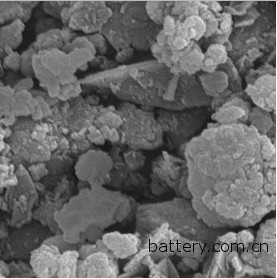
The new lithium-ion battery developed by researchers at Envia Systems Battery Technology Inc. in California, USA, stores twice as much energy per gram of current battery. The company will be at the US Department of Energy ARPA-E (Advanced Research Projects Agency-Energy). The third annual meeting was held to announce this breakthrough. Sujeet Kumar, co-founder and chief technology officer and materials scientist at Envia, explained: “We have achieved a storage density of 400 watt-hours/kg. We have built a 40-amp battery, car. Can be identified and used.†The battery has been verified by the independent energy density test of the Naval Surface Warfare Center.
The project received a $4 million grant from ARPA-E. Based on research from the US Department of Energy's Argonne National Laboratory on advanced composite electrode materials, the researchers found that high-energy manganese-rich cathode materials have greater Energy density. The research team then shifted the focus to the anode (the flow of lithium ions to the electrode that produces the current) and improved its performance by combining silicon and graphite. By mixing silicon with carbon, the researchers solved the problem of silicon anodes losing the ability to repeatedly charge and discharge other batteries. In short, silicon is expanding. Kumar admits: "Since the volume changes, the silicon anode is difficult to last for 10 cycles. However, by surrounding it with carbon paint and intertwining with carbon fiber, they solved this problem, and the battery they developed can be cycled 400 times. Mar added: "Since the silicon is destroyed in the first cycle, it can remain connected through carbon fiber. â€
Another problem facing car batteries is the so-called "thermal runaway," which is especially the test that car batteries must pass. This performance of the battery can be tested by quickly penetrating the battery with an 8 mm nail. Researchers claim that Envia batteries can pass this test. Kumar said: "The main reason is that this battery is very thin, it is easy to dissipate heat."
Ultra-thin, energy-intensive batteries save half the energy of each car. The battery is cheap, at $125 per kWh, less than half the current battery cost. However, in addition to further independent testing, automakers need to test the battery for many years. Atul Kapadia, Chairman and CEO of Envia, said: "We work with all the brand car manufacturers around the world. Our idea is to either form a joint venture to produce batteries, or perhaps let existing partners use the technology.
This technology can increase the driving distance of electric vehicles, such as General Motors' Chevy Volt. Each kilogram of battery can store more power, and electric vehicles can travel farther. This means that the Nissan LEAF can charge Envia's battery for as little as $10, and it can travel 300 miles between St. Louis and Chicago, instead of about 80 miles (129 km) that it can travel today. . In a statement announcing this scientific breakthrough, Kumar said: "We hope that Envia's new generation of lithium-ion batteries will revolutionize the electric vehicle industry, which eliminates three major obstacles to the large-scale use of electric vehicles: cost, distance and safety. Sex. A 300-mile trip (about 483 km) on a single charge will solve the problem of short driving distances for electric vehicles."
TL Series ,Corrugated Steel Sheets ,Silicon Steel Grades ,Grain Oriented Electrical Steel
Roller Bearing Co., Ltd. , http://www.nbballast.com